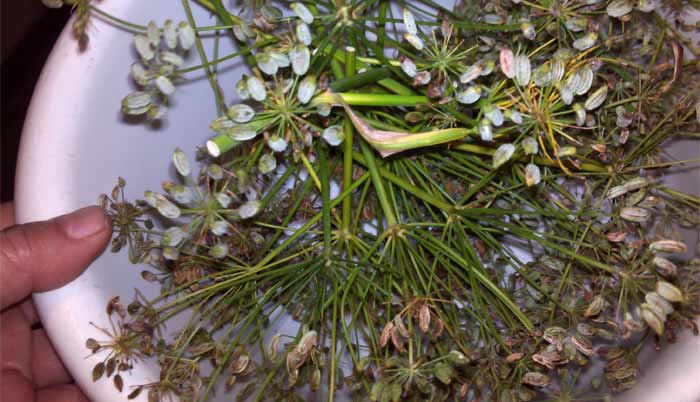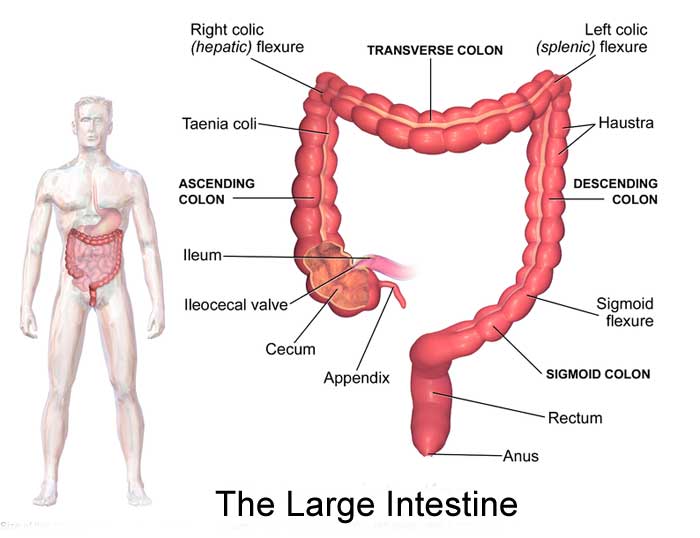Colon herbs and cleanses

Herbs are especially suited for healing the digestive tract, especially the colon. Also called the large intestine or the bowels, the colon's health depends on good diet, clean water, plenty of exercise, and regular use of digestive tonics.
Sometimes we ignore common sense, give in to fast foods, drink sugary sodas instead of herbal teas, and put off exercising. We should not be surprised when our colon reacts to this abuse.
When people eat foods that contain rancid oils and toxins, the colon suffers. When they don't have clean water, diseases like diarrhea, dysentery, and cholera run rampant. When humans become couch potatoes, over-indulging in low-fiber snacks and not getting enough exercise, constipation and gas are often the result.
When colon trouble strikes, we are miserable. Thank God there are lots of medicinal herbs available to soothe, heal, and protect our colons.
Seeds like flax and fennel heal the colon

Well-known and time-tested colon herbs include flax, fennel, plantain, chickweed, slippery elm, aloe vera, burdock, chamomile, catnip, turmeric, ginger, green tea, licorice, marshmallow, yellowroot, and mint.
When taken by mouth, herbal teas, tinctures, and capsules deliver the medicine right to the problem.
Within a few hours, anything taken by mouth should be traveling through the stomach and small intestines, and headed straight to the colon. With herbal enemas, the healing properties of herbs are only seconds away!
For now, let's concentrate on herbal teas taken by mouth instead of colonics (also known colon hydrotherapy). Herbal enemas and colonics are a subject for another day.
Herbs for the colon have stood the test of time.
Since the dawn of mankind, herbs have been used to heal and protect the intestines. From gas and indigestion, to life-threatening conditions like food poisoning, people have depended on medicinal herbs to ease suffering and improve digestion.
Read more about removing toxins and poisons from the digestive tract.
Problems involving the colon include gas, IBS (irritable bowel syndrome), constipation, diarrhea, inflammation, yeast overgrowth, parasites, polyps, cancers, and many other digestive diseases. Most colon problems can be successfully treated with herbs, diet changes, and natural remedies.
Even people with colon cancer can benefit from colon and digestive herbs. Medicinal herbs can help heal our colons after surgery, and they can even ease symptoms caused by chemotherapy.

Herbs for colon problems
- To relieve constipation, take flax seeds and drink lots of water.
- Slippery elm and aloe juice reduce the inflammation caused by IBS.
- Chamomile tea relaxes digestive tissues to ease cramping.
- Rosemary, peppermint, catnip, and fennel teas are excellent choices when suffering from gas, bloating, and indigestion.
- Getting rid of gas naturally is easy. Just eat a peppermint candy (most are made from real peppermint oil).
- Green drinks, with their high concentrations of live enzymes, repair free radical damage in the body and in the colon.
- Chewing fennel seeds can stop heartburn better than Tums or Rolaids.
These are just a few examples of how herbs and natural remedies can help keep the colon and bowels healthy.
Scientific studies
Diet is very important! Based on 172 studies and 71 clinical cases, results indicate that grape, soybean, green tea, garlic, olive, and pomegranate are effective against colon cancer. These herbs contain substantial amounts of flavonoids that help reduce cancer cell growth.
Grapes reduce the growth of cancer by increasing protein levels that help keep healthy cells safe. Grape extract alters the cell cycle, which leads to cancer cell death.
Soybeans help fight cancer due to potent saponins in the extract. These saponins work to inhibit the increase of cancer cells and to kill existing ones.
Green tea, with high levels of catechins, increase the rate of colon cancer cells. Read more about the benefits of drinking green tea.
Because of sulfur compounds in garlic, it is also used to fight colon cancer. Garlic extract inhibits cancer cell growth and increases natural killer cells. Read more about healing naturally with garlic.
Olives contain maslinic and oleanolic acids which are shown to induce programmed death in cancer cells.
Pomegranate's high levels of flavonoids, polyphenol compounds, and other components also protect against colon cancer by inhibiting receptors in cancer cells and preventing their growth. More research is underway.
Do a colon cleanse once a year
Colon cleanses can help the colon and digestive system to work at peak performance, and you should do one at least every year. A colon cleanse should not cause pain or misery. Like fasting, a cleanse is healing! You do not need to purchase powders, capsules, tablets, or kits. All you need to do is buy a few things at the grocery store.
Always plan ahead before your colon cleanse! Stock up on supplies, juices, and quality herbs. Take a day for yourself, read a good book, or watch a favorite movie. Relax during your cleanse for best results.
Some packaged "colon cleanses" can be hard on your body and might even cause cramping. Colon cleanses and laxatives containing senna and cascara come to mind. Cramping and pain during a herbal colon cleanse is not necessary or normal!
I like to do a simple cleanse in Spring while the dandelions are blooming. Dandelion tea is great for cleansing the system after a long winter.
The goal of a colon cleanse is to unclog your colon and give it a rest from the job of processing solid foods. A lot like a fast, colon cleansing is also good for the stomach, the liver, and other organs. Even the brain can benefit from a good colon cleanse.
The best cleanses are gentle and effective without any harsh side effects. They can be a simple as going without food for 12 hours, or a complicated week long program. One word of warning, never do a cleanse if you are diabetic or pregnant. If you are taking medications, talk to your doctor before starting a cleanse.
Want to know how to do a safe, comfortable 24-hour detox cleanse? Directions are included below.

24 Hour Colon Cleanse directions:
On the evening before a 24 hour colon cleanse, eat plenty of leafy green vegetables with some fish or soy protein (nothing fried, creamy, or spicy) for dinner. An egg would work, or salad with grilled salmon. Go easy or avoid grains, fats, oils, and dairy.
The next morning, have a glass of water with the juice of a lemon. A cup of coffee is OK if you must have it, but do not add sugar, milk, cream, or unhealthy powdered creamer. A splash of milk will be alright if you must have it.
At midmorning drink some unsweetened cranberry juice or a cup of your favorite herbal tea with a glass of water.
At lunch have a glass of water and some pure apple juice. If you must eat something, have a piece of dry toast, a couple of saltines, a small orange, or a small apple.
In the afternoon drink a cup of chamomile or mint tea and a glass of water.
Your evening meal should include papaya or pineapple juice, nothing solid unless you feel really hungry or have a headache. If you must have food, try getting by on applesauce, yogurt, dry toast, or a cup of clear vegetable soup.
Have more herbal teas in the evening. You might also eat a small piece of fruit or some saltine crackers if you fasted at dinner.
The next day introduce solid foods back into the diet. Eat protein likes eggs or peanut butter on toast for breakfast.
When breaking a fast, introduce food slowly starting with small amounts of protein, fresh fruit, vegetables, and herbs. Try to buy the cleanest produce possible. You don't want to do a cleansing detox only to turn around and consume herbicides and pesticides!
During your colon cleanse
During a fast or cleanse, practice deep breathing techniques and walk some each day. Get at least ten minutes of sun on your face and shoulders if possible. Pick a place with clean air, not a polluted city street!
When fasting or cleansing, get adequate sleep and drink six glasses of water every day along with herbal teas. Take time to meditate, pray, and relax. Smell the roses and laugh! Fasting is wonderful for the body and the spirit.
Expect side effects during a colon cleanse. They are normal as the body heals.
Side effects of a cleanse or fast include light headache, bad breath, some diarrhea, and mild weakness as the body works to rid itself of toxic waste.
After fasting or cleansing, an herb’s medicinal properties are more readily absorbed into the system. Results are achieved at a faster rate when the body is clean.
Does the colon need to be cleansed?
With all the health problems in the world today such as obesity, fatty liver disease, cancer, diabetes, heart disease, high blood pressure, arthritis, and other chronic conditions including IBS, constipation, diarrhea, and irritable bowel syndrome, people are turning to herbal cleanses more than ever to improve the health of their bodies.
After consuming lots of processed foods, cleansing is very important to restoring health.
A 24-hour cleansing detox is good, but one cleanse is not going to undo damage caused by years of eating processed foods and toxic ingredients. Detoxing and cleansing are great but everyday diet is even more important, so eat right and then detox occasionally as needed.
Even when eating healthy, detoxing and fasting a couple times a year is recommended for physical, mental, and spiritual health.
Good diet, regular detoxing, exercise, lots of clean water, and deep breathing help keep the body healthy.

Detox your digestive system before treating more serious problems with herbal remedies.
An herbalist’s work is to help the body heal itself by addressing the worst problem first. When one concern is addressed and treated, additional problems may take care of themselves.
Herbal remedies work best in a clean environment. When the mouth, lymph nodes, digestive tract, urinary system, liver and other organs are not clogged with toxins, the body can respond to herbal remedies very quickly. If you eat fast food, lots of meat, lots of dairy, and processed foods, healing takes a lot longer.
It is important to detoxify the digestive system on a regular basis, at least once a year. For optimal health, eat a good diet every day and detox a few times a year especially in the spring after a long winter.
Once the system is clean, medicinal herbs have an easier time doing their jobs.
Fasting is good for the body, mind, and spirit.
Detoxing and fasting are a lot alike. Most animals instinctively fast when they are sick or injured. When treating any chronic condition, fasting can jump start the healing process.
A healing fast can last anywhere from 12 hours to a week depending on existing conditions and desired results. Fasting can mean eating only certain things like vegetable broth. It can also mean giving up all solid foods. Never stop drinking water which could lead to dehydration.

Mild cleanse or something more extreme?
There are many types of herbal cleanses and fasts including a blood purifying cleanse, a liver cleanse, a 12 hour cleanse, a 24 hour detoxification, a heavy metal cleanse, and more.
A cleanse or fast can be as simple as eating only vegetables and fruits for a day. It can be as complicated as preparing all sorts of broths, smoothies, and green drinks.
Herbal cleanses offer all kinds of benefits including glowing skin, increased energy levels, and less pain in chronic conditions like arthritis.
The type cleanse you choose depends on existing health problems, desired results, and daily responsibilities. You don't want to be in the middle of a cleanse while running a marathon, doing any kind of hard labor, or under mental stress.
What is a colon?

The colon, also called the large intestine, is made up of three main parts.
- The ascending colon is on your right side and receives waste material from the small intestines
- The transverse colon goes across you body under the stomach
- The descending colon is on your left side and ends at the rectum
The large intestine also contains the appendix, the anus, and other parts shown on the diagram above.
Colon problems, although common, are not normal.
Colitis, irritable bowel syndrome, spastic colon, polyps, food allergies, and colon cancers are on the rise in today's society. There are many things that contribute to poor colon health.
Factory farms are growing and harvesting foods that lack basic nutrients, and are saturated with pesticides, herbicides, and other poisons. We import wheat and other pantry staples from foreign countries that use cancer causing weed and insect killing sprays.
Hybrids and genetically modified organisms (GMOs) are grown for yield and profit, not for taste, nutrition, or health. Adding to the problem, every day consumers eat tons of processed foods that contain little or no fiber with tons of saturated fat and low quality vegetable oils. The only live enzymes in fast food are lettuce, tomato, and onions!
Fast food establishments contribute to colon problems.
Fixing a plate of raw veggies or fresh fruit seems like a lot of trouble when there's a fast food joint on every corner offering hamburgers and fries for less than ten bucks. Where can you even buy a plate of fresh, clean, organic veggies, prepared and ready to eat at any price?
Farm-to-table eating establishments are out there, but they tend to be expensive, require reservations, and don't have drive-thru windows.

Is America's food safe to eat?
There are constantly new reports about the food supply becoming contaminated and food recalls are more and more common. Salmonella and E coli bacteria contamination is occurring much too often for comfort.
E Coli is especially dangerous on salad vegetables like lettuce that are eaten fresh without cooking. Washing each leaf under running water and rinsing in vinegar solution is necessary to remove harmful bacteria. This extra work takes time but really helps to protect the colon and digestive system from toxins and pathogens.
Good diet is important to the colon.
A good diet with lots of water and fiber is the best way to keep the colon and bowels healthy.
Fresh veggies, legumes, fruit, green herbs, and water should be consumed throughout the day, not just one apple or a bowl of oatmeal every now and then, but plates filled with fresh salads, broccoli, greens, carrots, squash, beans, onions, peppers, tomatoes, other vegetables, and whole grains should be eaten every day.
Drink lots of water hand herbal teas between meals. The colon needs liquid to keep things soft and moving. Of course, as with all things, you can overdo it. Too much water can cause dangerous salt imbalances, so do your research.
Most organic produce is worth the extra cost.
A local grocery store sells regular celery stalks for around a dollar. Most organic items cost only 50 cents or so more than their toxic counterparts. Good food is not expensive if you plan carefully and fix it yourself. It is worth it to keep your colon and digestive tract healthy.
Some things are grown without harmful chemicals even though they might not be labeled organic. Don't bother buying organic avocados which have a tough outer skin and are rarely sprayed with poisons.
Some things like strawberries are heavily sprayed in the fields, so look for organic. Other things, like cranberries and citrus fruits, are rarely sprayed. For more information see the clean and dirty list of common vegetables and fruits.
For more information about healing digestive issues with herbs, see:
Treating constipation with herbs
Healing hemorrhoids with herbs
Colonoscopies for colon health
It is recommended that people over 50 get regular colonoscopies. Even though prepping for this test is unpleasant, it could save your life.
I have had two colonoscopies so far. The doctor removed 5 polyps during the first one, and 6 during the 2nd one five years later. Polyps can turn into cancer, so I was thankful to get them out of my colon. Please talk to your doctor about this preventive procedure.
If you are scheduled for a colonoscopy, start preparing yourself a week ahead of time by eating healthy foods that build immunity naturally.
It is good to eat a raw pineapple a week before any scheduled medical procedure! The enzymes in fresh pineapple help you to heal if polyps have to be removed.
Be sure to follow your doctor's directions. If your colon is not clean during the colonoscopy, they might have to reschedule.
*When fasting, drink plenty of fresh, pure water but not so much that vital minerals and salts are washed away. Any fast longer than 12 hours should be undertaken under the supervision of a healthcare professional. Over-the-counter laxatives can be addictive and dangerous so use with caution.
Always consult with a healthcare provider before using any herbal remedy especially if pregnant, nursing, or taking other medicines.
Sources:
https://pubmed.ncbi.nlm.nih.gov/32377288/
https://www.ncbi.nlm.nih.gov/pmc/articles/PMC7187726/
Blessings to you and yours!
Thanks so much for reading my blog. Jan.

*Note - the information on this website has not been evaluated by the Food and Drug Administration.
© 2005-2024 website design and content by Janice Boling